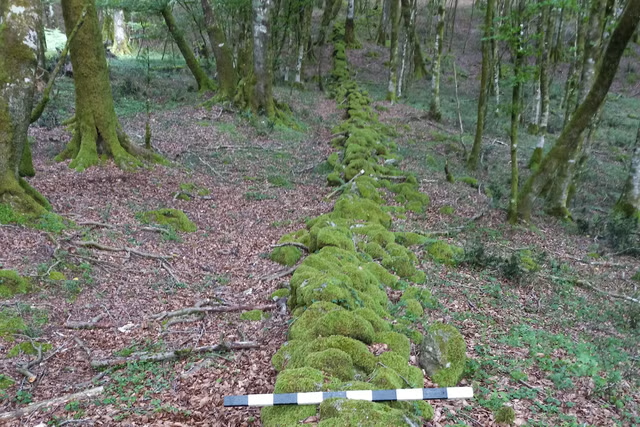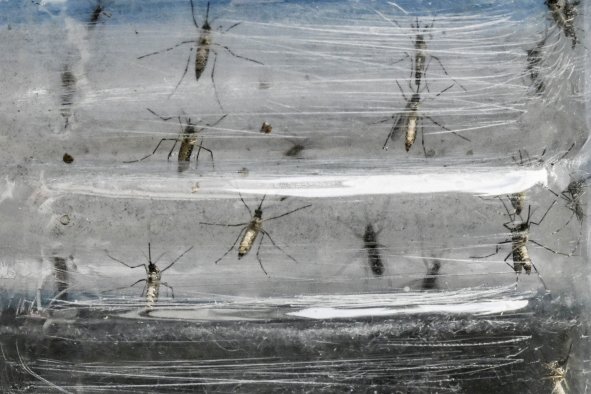Hundreds of thousands of lifeless fish have washed up on the shores of California's Lake San Antonio in an unprecedented mass die-off affecting a wide variety of species.
The deaths began last week, when smaller baitfish were found at the water's edge on Friday, but in the days since, larger and larger species of fish have also washed up on the lake's beaches.
"It seems like every fish species in the lake is being impacted. We have never seen this type of multispecies die-off, especially on this scale," Bryan Flores, Monterey County chief of parks, told SFGATE.
The plague has prompted closure of the popular lake area, while officials test the water and clean up the shores, the County of Monterey said on Wednesday.
The dead fish included smaller shad, as well as trout, carp, crappie, catfish, and bass. One dead bass weighed between 3 and 4 pounds, said Monterey County officials.
"There is a large fish death event happening at Lake San Antonio," the County of Monterey said in a Facebook post on Saturday. "The fish die off we alerted you to [last week] has gotten worse, and the lake is being closed as a public health precaution while testing and clean up is being done. All current campers and boaters are being asked to leave and no new guests will be admitted," they said in a post on Wednesday.
The range of species affected and the sheer number of dead fish washing up is unprecedented for Lake San Antonio, which is an artificial lake formed by a dam on the San Antonio River. The lake is a popular destination for a variety of recreational activities, including camping, boating, hiking, and fishing.
It was initially suspected that the heat wave currently scorching California and the rest of the U.S. southwest may have killed many of the fish, causing them to wash up dead. However, the heat would only be expected to impact fish that spend most of their time near the water's surface, and even bottom-dwelling catfish are being found dead.
"We're starting to see these fish that shouldn't really be impacted by the heat … that's when we said, wait a minute, something else might be going on," Flores said.
Monterey County staff also suspected that the heat wave could have led to a drop in the level of oxygen dissolved in the lake water, causing the fish to asphyxiate. Other fish kills around the world have resulted from large amounts of nutrients or organic matter entering the waterway, causing an algal bloom that uses up all of the oxygen. This is exactly what happened in the Darling River in Australia last year, where millions of dead fish blanketed the water's surface.
"Dead fish carcasses will exacerbate this type of event. That's a good reason for them to be collected and removed if they're accumulated in a limited area," Stuart Khan, a professor of environmental engineering at UNSW Sydney, told Newsweek.
However, water tests done by the state biologists showed that the water had normal oxygen levels, Bay City News reported.
"There are, of course, other ways that fish can be killed, including poisoning by release of a toxic chemical," Khan said. But officials don't suspect a harmful substance has been dumped into the water, however, as only fish are being impacted, with local birds and mammals appearing unaffected.
"If it was a poison, you'd think it would be impacting the other species," Flores told Bay City News. "More than likely, it is some kind of biological process that's occurring, whether or not it's algae or protozoa."
So, for now, the cause of this mass die-off remains a mystery. Monterey County officials have sent the water off for testing to detect if there are any harmful chemicals, algae, or algal toxins in the water, the results of which are expected next week.
If the tests indicate that there is no risk to humans or pets, the lake will be reopened after all the fish are cleaned up. However, this is anticipated to take several weeks due to the immense number of dead fish.
"Our apologies to those who had plans at the lake. We will keep you informed about what testing tells us and clean up efforts. We hope to see you back at the lake soon," Monterey County said in the Facebook post.
Do you have a tip on a science story that Newsweek should be covering? Do you have a question about fish kills? Let us know via science@newsweek.com.
Disclaimer: The copyright of this article belongs to the original author. Reposting this article is solely for the purpose of information dissemination and does not constitute any investment advice. If there is any infringement, please contact us immediately. We will make corrections or deletions as necessary. Thank you.



